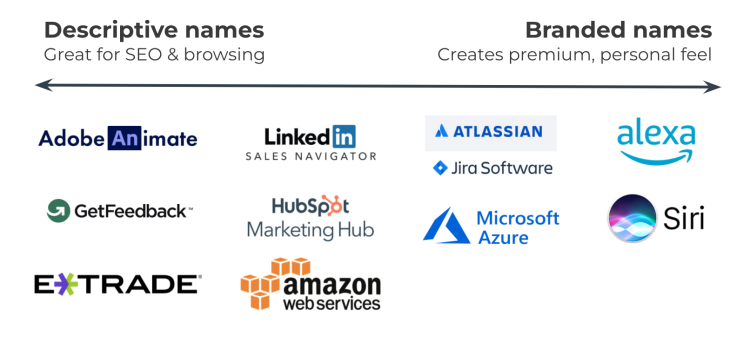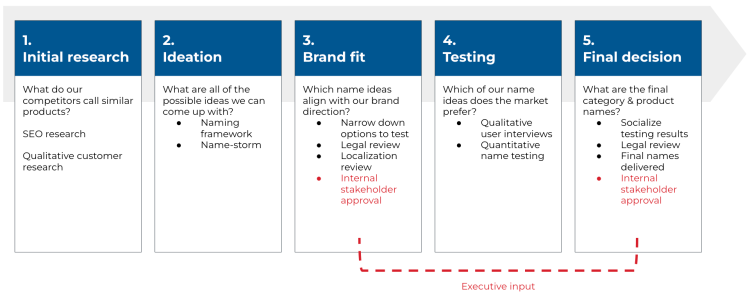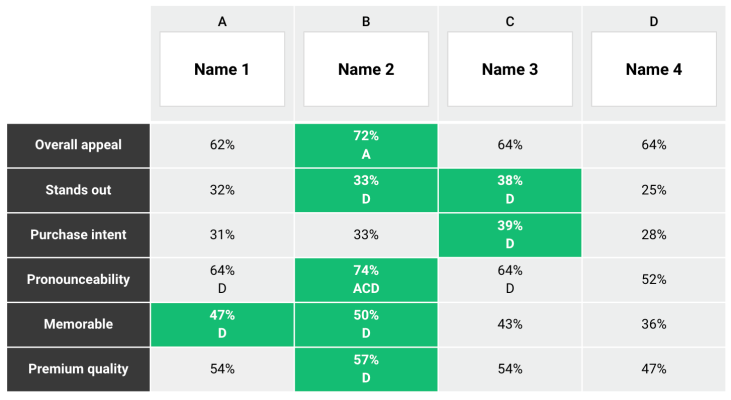Autres ressources
Your business name is the cornerstone of your brand. A strong name will help you stick in the mind of potential customers and make you stand out from the competition. You’ve developed your concept, your product or service, your business model, and all of the relevant preparation. All that’s left is figuring out how to name your business. Help is here—we’ve put together some background information as well as tips and tricks to help you name your business.
Explore the many ways to gain market intelligence
SurveyMonkey offers flexible solutions to help you uncover meaningful trends in your markets.
Importance of a business name
Your brand name plays a key role in your success. It’s used when people search for your products online and when people talk about your business and its offerings. The right name not only identifies your business—it can make or break your success.
Better stock performance
A 2018 study looked into the effect a company name has on its stock performance. Their conclusion? In a highly competitive stock market, a name that is short, fluent, easy to identify, and contains good moral meaning will have more investors, higher per capita shares, and the company will be more valuable.
Differentiation
Your business name should differentiate you from your competitors. If your name is too close to one or more competitors, consumers will probably be confused about who is the provider of the product or service they desire.
Brand recall
A test of brand recognition, brand recall asks customers to think of brand names associated with a specific industry or product category. Your business name needs to be memorable. Learn more about brand recall and brand awareness.
Drives referrals
Word-of-mouth advertising is a powerful marketing tool. A great business name that’s memorable and easy to share with others will be talked about and will reap the benefits of all types of referrals—word-of-mouth, online reviews, social sharing, and emails.
What defines a good business name?
Names are powerful, and you likely have a lot riding on yours. There are plenty of websites willing to mix words up for you to produce the “perfect” name. Unfortunately, most of what they deliver is gibberish. Instead, take your time and consider these qualities as you ponder names.
Originality
It’s tough to be original. Start with a free flow of ideas—you’ll edit the list later—and go from there. Use a keyword list from your favorite website or SEO tool to inspire you, grab the nearest book and flip through it to find words that “speak” to you, and don’t forget to consider wordplay for a clever option.
Clarity
Your business name should be clear—you can get creative with spelling, but make sure it’s clear and memorable or your business name will be forgotten.
Future-proofed for success
Make sure your name will resonate as long as your company lasts—hopefully well into the future. Keep in mind that your offerings may expand and change, so don’t lock yourself into a name that won’t work well. Entertainment Weekly magazine never thought they’d go monthly, but they recently did just that—and kept the confusing “weekly” in their name, much to readers’ confusion.
User-friendly
Is the name you’re considering easy to say, spell, and type into a search engine? Your name needs to be easy for your customers to find—or they may just find someone else.
Availability and isn’t already taken
During your naming endeavors, you’ve probably plugged all of your preferred names into a search engine to see if anyone else is using the business name. This includes doing trademark research. Check with the US Patent and Trademark Office to search its trademark database for names similar to yours, names used on related products or services, and if there is a business currently using the name.
In addition to the name being available, you’ll need to look at domains for your website. For SEO and to legitimize your brand, you’ll want to put your business name in your URL. Use GoDaddy or ICANN to find out if yourbusinessname.com is available. If a .com URL isn’t available, you can choose one of the hundred other options (.net, .co, .me, .tv, etc.), but a .com address will give you more authority and bring in more traffic.
If your domain isn’t available, try adding a word before or after your business name, like “go,” “app,” or “get.” This may free up some favorable URLs.Don’t forget to check social media channels to see if your business name is taken. Social handles are easy to change with a word or an underscore if needed.
Test your name before you go to market with our Brand Name Analysis.
Your name evokes a feeling
Use your imagination to use words that evoke feelings and images with your brand name. For example, Last Crumb sells limited batches of luxury cookies. You can imagine wanting to eat every last crumb.
It speaks to your audience
Resonate with your market by playing with words used within your industry. For example blockchain-related businesses Coinbase and CoinDesk.
It’s memorable
A few things that will make your brand name memorable are:
- Rhythm
- Repetition
- Quirkiness
- Alliteration
- Short
- Looks good in a logo
It’s also pronounceable
Make sure your business name sounds good when spoken aloud. Avoid anything that becomes a tongue-twister when you try to say it.

How to come up with a business name
Now that you know how important it is to have a great business name and what defines a great name, it’s time to look at choosing a business name. And the right place to start is with a little market research. In fact, research is a big part of whole your name-choosing experience, as shown in this graphic.

Conduct market research on business names in your industry
You may have already performed market research when deciding to build your business. If not, it’s time to get started. There are things you need to know about your name and the market.
Who are your top competitors? What are their names? Keep these front of mind when you’re thinking about yours. You don’t want to be too close, or you could lose business to the competition.
SEO research
Organic and search engine marketing are probably going to be a big part of your marketing strategy. Find the top-performing keywords for businesses that offer similar products or services like yours. Make sure the keywords are relevant to you and that the average monthly search volume is high enough to attract attention.
SEO may not be a huge factor in your actual naming process, but if you can fit a keyword naturally into your business name, go for it.
Ask your potential customers how they view your competitors’ names. What they like or dislike about them will give you some initial direction. For example, they may feel a name sounds cheesy, is too short, or sounds too much like something else. This gives you a jumping-off point for your naming.
Brainstorm a list of names
Go ahead—brainstorm! List out every idea. Work with your team or other stakeholders to think of names. Write them all down. You will probably generate a pretty big list, and that’s fine. You want to start with as many names as you can think of. And yes, you can use one of those business name generators to help you get started.
Expand on your initial list
Take a break. Walk away from your list for a little while. When you return to it, expand on it. Consider what kind of tone you want, what words resonate with you, and what brand ethos you want to portray. Let your creative juices run wild now because soon enough it will be time to narrow down your choices.
Narrow it down to your favorites
Come up with your evaluation criteria and go through your list. Your criteria should include:
- Brand fit: Does the name work with your company vision and values? If not, cross it off the list.
- Competitive differentiation: Is the name different enough from your competitors? Is there anyone a customer could confuse your brand with another? If so, it’s off the list.
- Resonates with target buyer: Run the names by your team, friends, family, and your target audience. Any name that doesn’t resonate gets cut.
- Doesn’t hold you back from expansion in the future: Don’t include a keyword in your name that you’ll regret later. Today you may be making women’s shoes, but someday you may expand into handbags, men’s shoes, or even children’s shoes.
- Not offensive to marginalized groups: Your name should not evoke any hints of racism, inequality, unfairness, or exclusivity from anyone of any culture.
- Customer and employee belonging: You, your customers, and your employees all need to feel comfortable being a part of your brand family.
Test to see which name is best
Now that you’ve narrowed down your business name choices, it’s time to do a little more research to find which name your target customers respond to.
Brand name testing
SurveyMonkey has multiple market research solutions, including brand name analysis. You can present your target audience with your narrowed list of business names and ask for feedback on each one. Compare them on a variety of metrics, like appeal, effectiveness, and relevance. While you’re at it, you can also do concept testing for your product offerings to make sure they fit in with your brand vision and name.

Use audience feedback to make changes or tweaks. For example, the audience liked Name 2, but you prefer Name 4. The respondent's feedback was that Name 4 was more difficult to say. Use that feedback to improve the spelling and enunciation and test again.
Pick your final name
It’s time to review your research results. Look at all of your data—SurveyMonkey shows the results of open-ended questions in a word cloud so you can determine key takeaways. A Top 2 Box score approach to combine positive responses to each question into a single percentage may make analysis easier. And just like that, your business has a name.
Tips for creating a business name
We’ve talked about an overall strategy for choosing a business name, and now it’s time for some practical tips.
1. Use acronyms
You can probably think of several companies that use acronyms for their business names. If your business is complex, an easy-to-remember acronym might be a good choice.
Examples:
- 3M stands for The Minnesota Mining and Manufacturing Company
- AT&T stands for American Telephone and Telegraph Company
- EPCOT stands for Experimental Prototype Community of Tomorrow
- NASA stands for National Aeronautics and Space Administration
- NERF stands for Non-Expandable Recreational Foam
- WD-40 stands for Water Displacement 40th formula
2. Create mashups
Take 2 or 3 meaningful words that represent your business and combine them.
Examples:
- Netflix = internet + flicks (movies)
- TripAdvisor = trip + advisor
- Nabisco = National + Biscuit + Company
- Evernote = forever + note
3. Draw inspiration from mythology and literature
Is there a mythological figure that’s relevant to your business? Maybe it’s time for a little research because this naming strategy seems to work out well for those that use it.
Examples:
- Nike is the Greek goddess of victory, and the brand sells athletic clothes and shoes.
- Hermés is the messenger of the gods as well as the god of trade. The brand specializes in leather bags, apparel, and lifestyle items. Its founder’s name, coincidentally, is Thierry Hermés.
- Pandora is the Greek goddess known for her curiosity. Pandora, the streaming radio platform, invites curious listeners to open up a whole new world of music.
4. Use foreign words
You can go with foreign words if you want, just be sure they don’t mean something unintended. Do your research and use Google translate.
Examples:
- LEGO actually is a mashup of two foreign words, “leg godt.” In Danish, that means “play well.” An apt name for a toy company.
Chipotle is derived from the Nahuatl word for a smoke-dried jalapeño. Sounds like a perfect match for a Mexican restaurant.
- Über is a German word for over, above, or across. Here, the ridesharing platform has omitted the umlaut.
- Acer is the Latin word for sharp, acute, able, and facile. Sounds about right for a tech company, doesn’t it?
- Zappos is derived from the Spanish word for shoes—zapatos—which is exactly what Zappos sells.
5. Use your own name
It’s your business, if you feel it’s appropriate and you like it, use your name in the business name.
Examples:
- Hershey’s is named after its founder, Milton S. Hershey.
- Tiffany & Co. takes its name from one of the founders, Charles Lewis Tiffany.
- Audi uses a foreign word that’s actually a Latin translation of founder August Horch’s last name.
- Bankable Productions is model Tyra Banks’ entertainment company.
6. Look at a map
Spin the globe and see if anything inspires you. There are some amazing, beautiful names across the world.
Examples:
- Amazon (Amazon River)
- Nokia (Nokianvirta River)
- Duane Reade (the streets on two sides of its first warehouse)
- Cisco (San Francisco)
- Adobe (Adobe Creek)
7. Utilize nicknames
Do you or one of your family members have a great nickname? That might make a good business name!
Examples:
- Sony is actually a mix of the Latin word for sound, Sonus, and the American nickname, Sonny.
- Wendy’s fast-food chain is named after the founder’s daughter’s nickname.
- Air Jordan sneakers are famously named after athlete Michael Jordan.
- Ben & Jerry’s ice cream is named with the nicknames of founders Ben Cohen and Jerry Greenfield.
- Kinko’s copy and office supply store was named after the founder, Paul Orfalea. His nickname was Kinko due to his red, curly hair.
8. Use symbols
Draw inspiration from a symbol or element of your business.
Examples:
- Reebok is a reimagined spelling of the Afrikaans word rhebok, an African antelope or gazelle.
- Six Apart, or 6A, has founders who were born 6 days apart.
- 5 Guys American restaurant takes its name from Jerry Murrell, the founder, and his 4 sons.
- Valve, a game development company, takes its name from the symbolism of a valve—a lever that makes the flow of ideas readily available.
- Bullfrog Productions was named after an ornament that hangs in the office.
9. Make it descriptive
Some company names use descriptive words that literally tell you something about them.
Examples:
- 7-Eleven literally describes the hours the stores are open: 7am-11pm daily.
- Cheesecake Factory leaves no doubt their original premise was to sell cheesecakes.
- Toys R Us sums up exactly what to expect in their stores.
- General Motors clearly sells vehicles.
- The Weather Channel is just what it says it is.
10. Abbreviate
Businesses with long names will often use either an acronym or abbreviation to make the name easier for customers to remember.
Examples:
- BIC Corporation was founded by Marcel Bich. He dropped the “h” to avoid mispronunciation.
- K-Mart was founded by Sebastian S. Kresge, but Kresge-Mart doesn’t have the same appeal.
- P.F. Chang’s restaurant name is formed from the founder’s (Paul Fleming) initials and the chef’s (Philip Chiang) last name.
- Skype was going to be called “Sky Peer-to-Peer” after its functionality of connecting peers “in the sky.” That name wasn’t as short and catchy as Skype.
Mistakes to avoid
Not everyone finds that sweet spot for their business name. When choosing your company’s name, try to avoid these common mistakes.
Hard-to-spell names
While creative spelling may seem like a good idea, names like Flickr and Tumblr will always be victims of autocorrect.
A name that is limiting
Roofing Rochester NY may come up first in organic search results with that name, but what if they expand into other types of home improvements or decide to work in a wider service area?
A name that is taken
Make sure you’re thorough in your research. Just because a name is used doesn’t mean you can’t pursue it, but take a beat and think it through. Dove soap and Dove chocolate, Delta faucets and Delta airlines, and Domino’s Pizza and Domino Sugar have made it work, but we’d advise against it.
A meaningless name
It’s tempting to follow in the footsteps of Häagen-Daz and Etsy, using words that aren’t really words. The names are catchy but don’t convey anything about the businesses or their offerings. If you can come up with something that has a connection to your vision or business offerings, you’ll be better off.
Choosing a Business Name
It isn’t easy to choose a business name, but if you follow our advice, it will be a little bit easier. Whatever you do, don’t skip the research steps. They are critical to ensuring you land on the right name. SurveyMonkey has everything you need to perform the necessary market research for your business naming process. And you’ll find our brand name analysis tool is quite valuable as you narrow down your choices.
